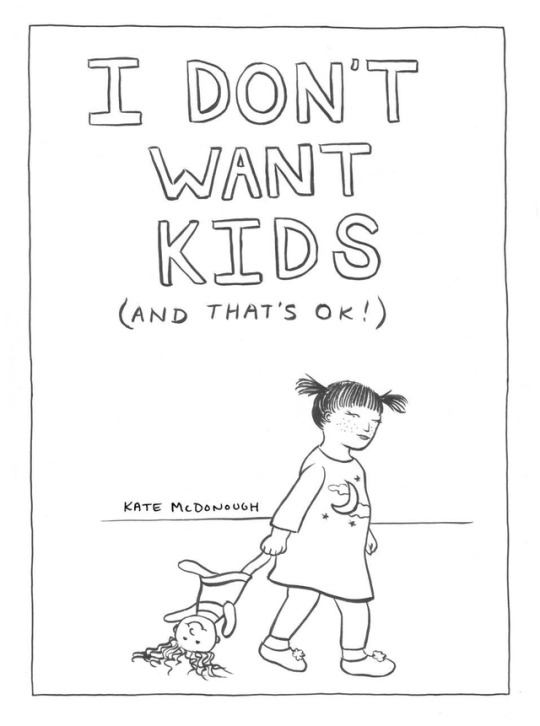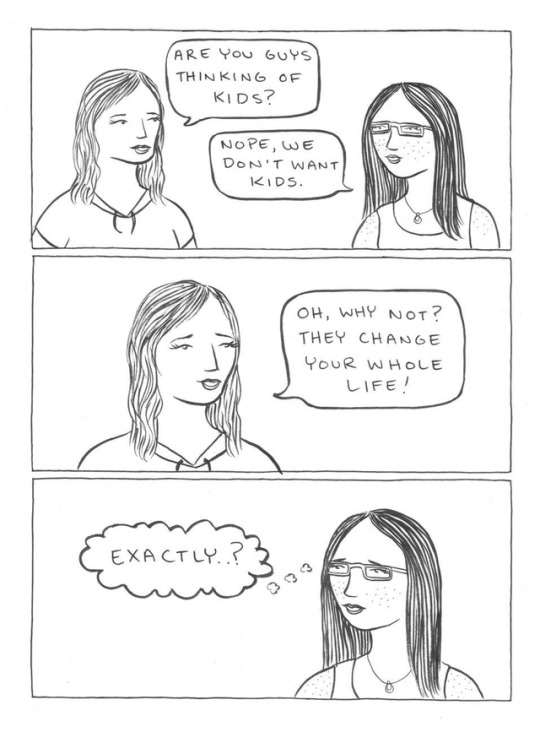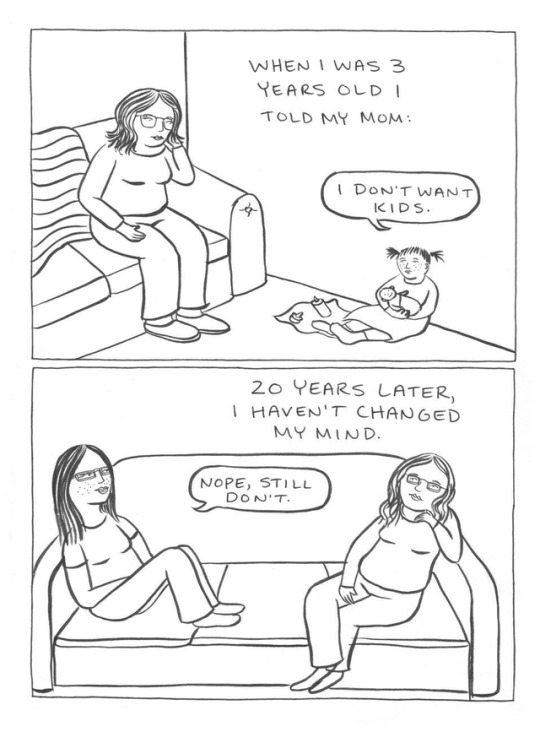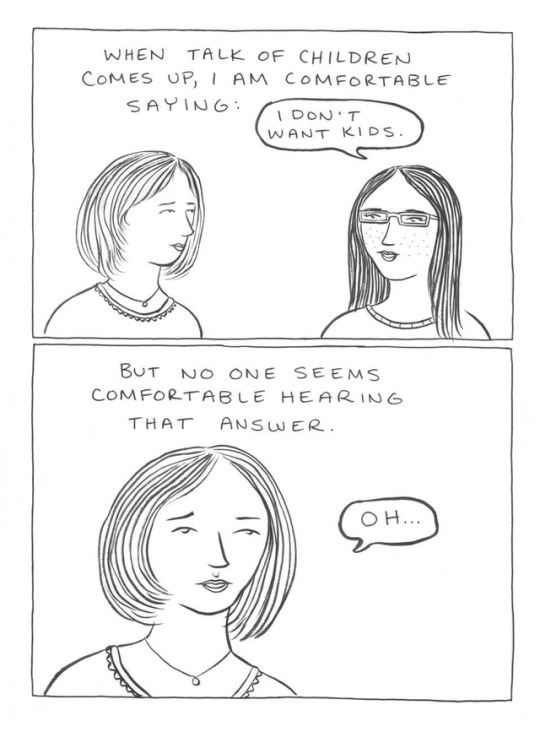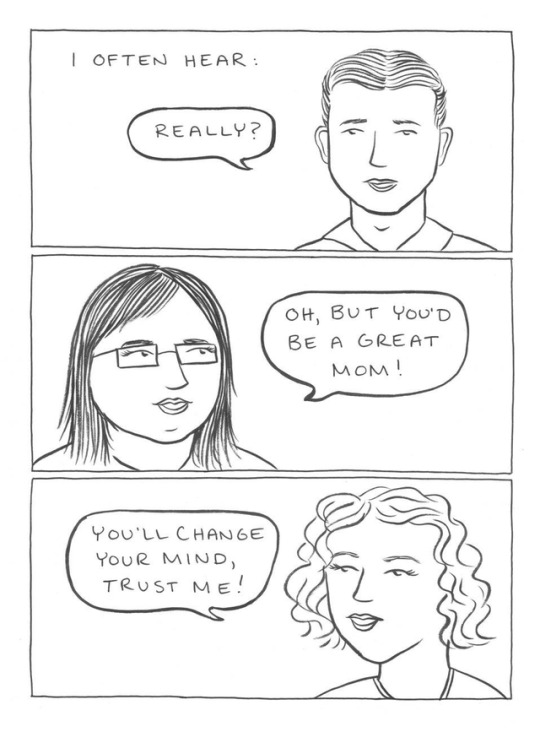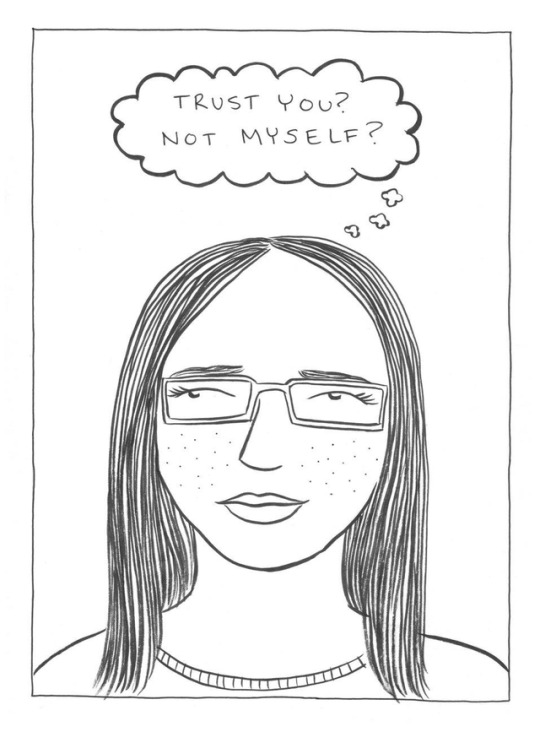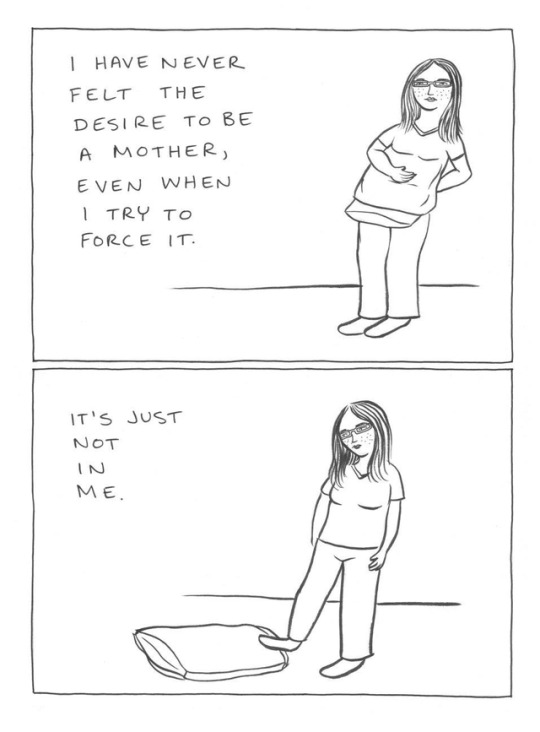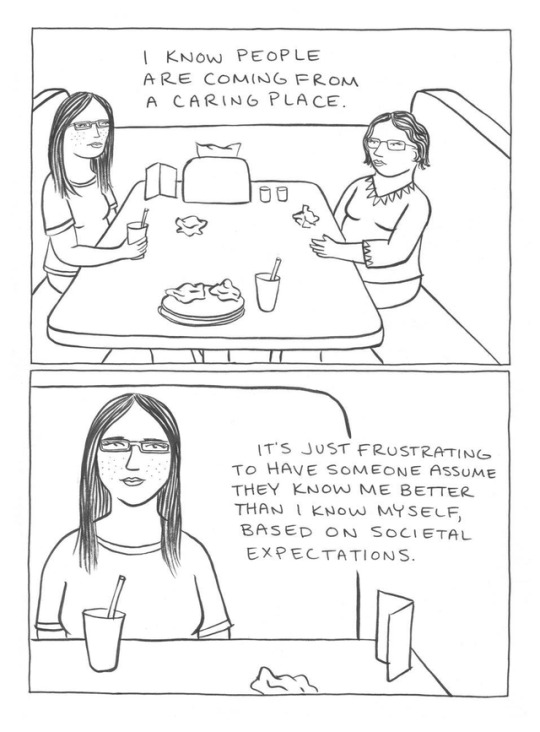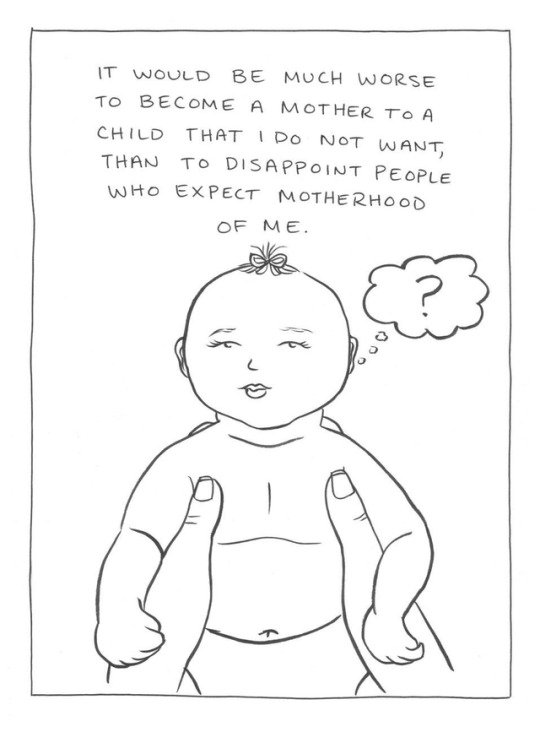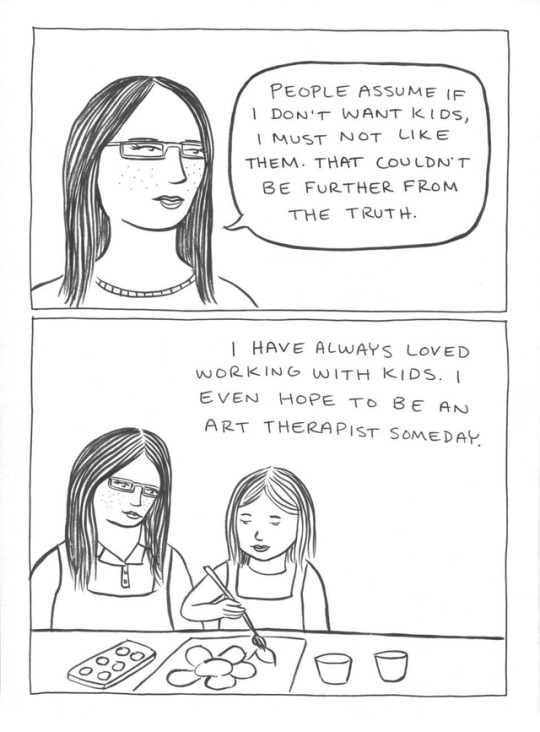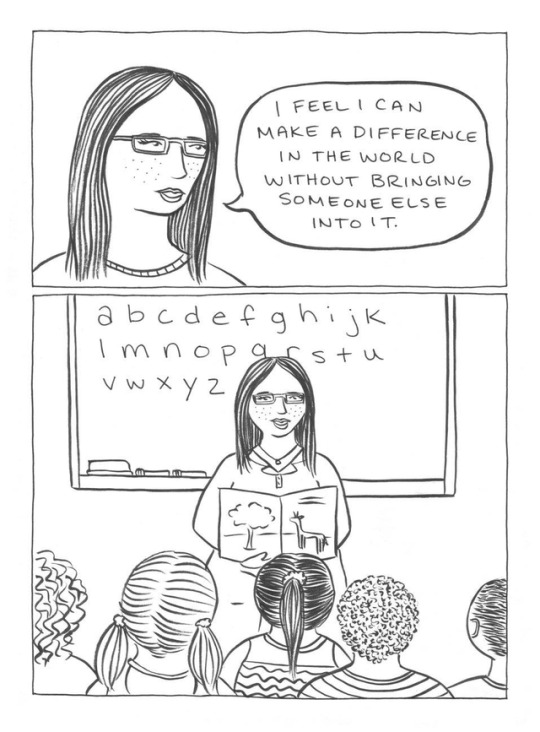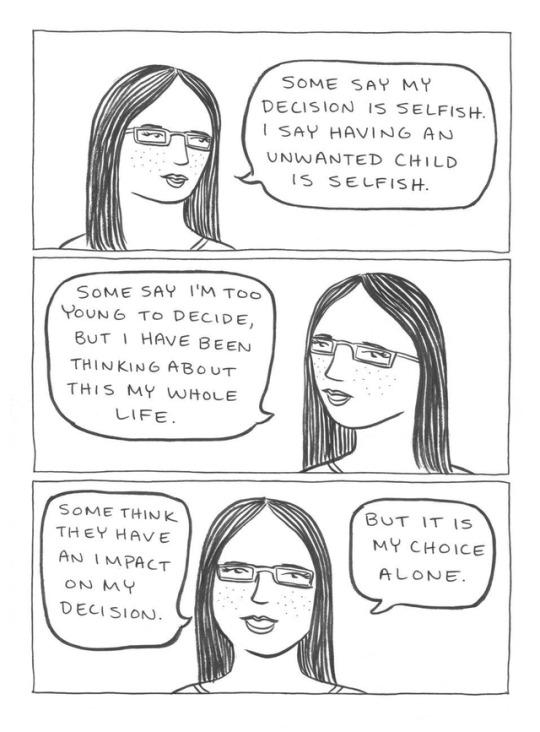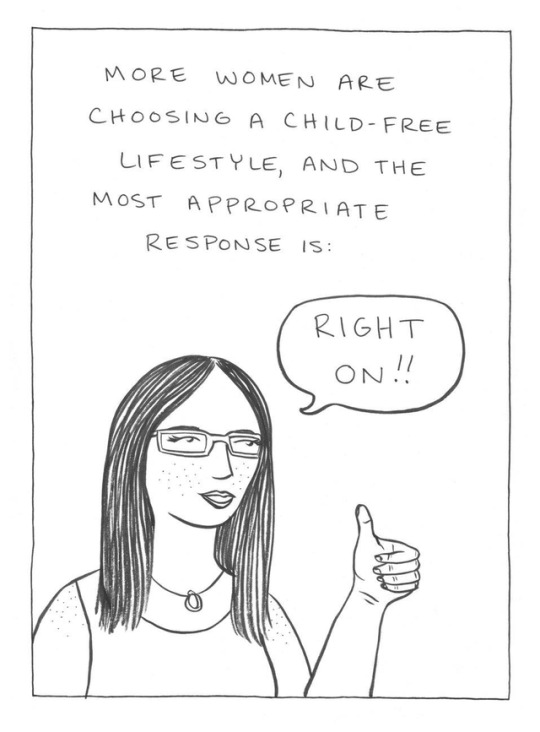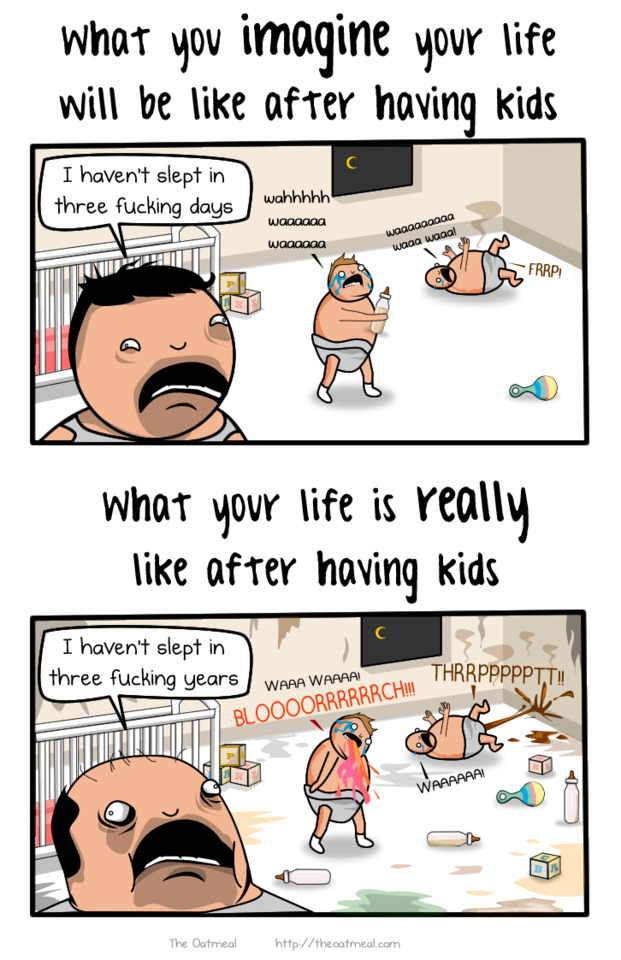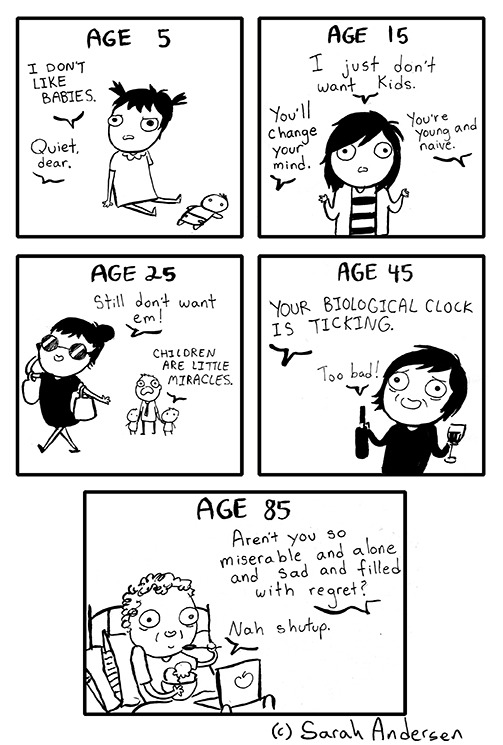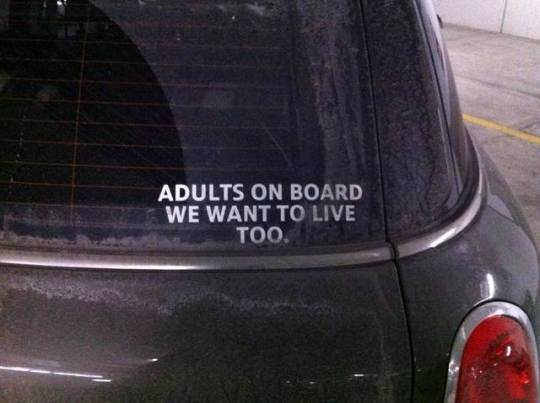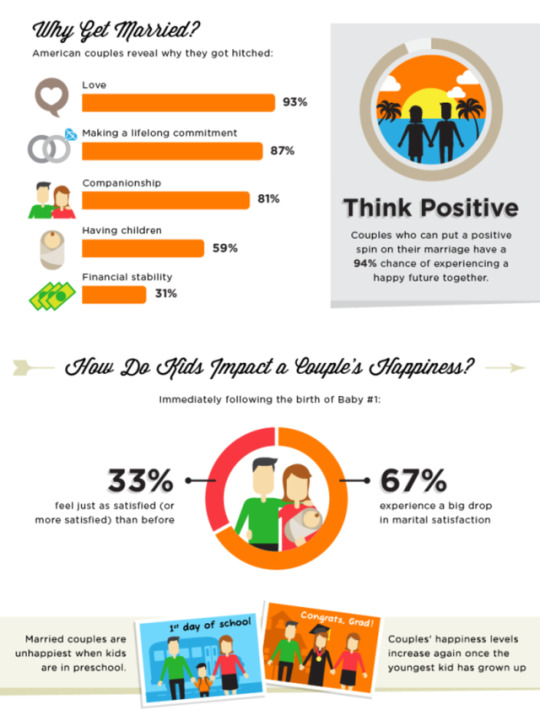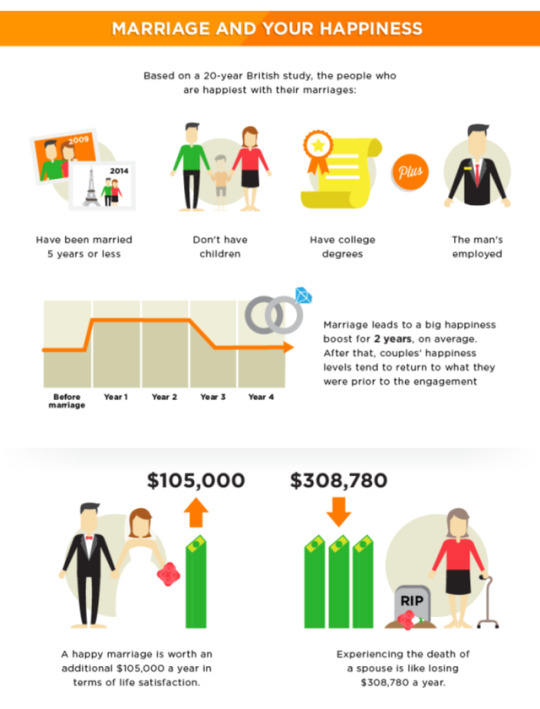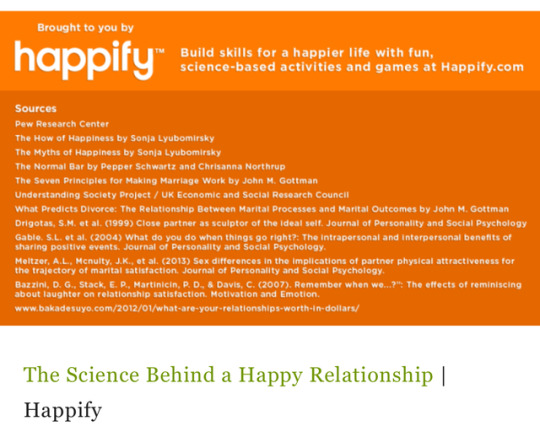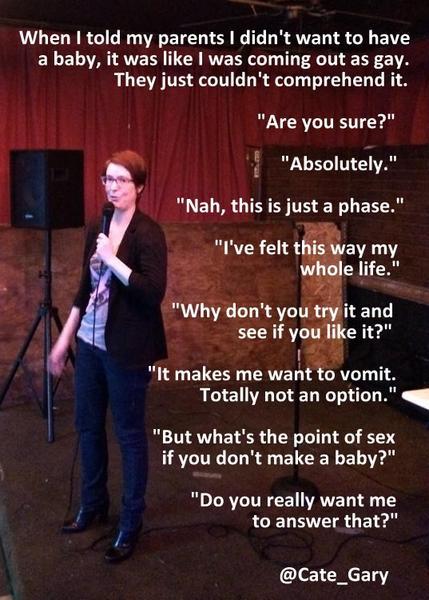Don't wanna be here? Send us removal request.
Text
Saw this gem recently, couldn’t resist sharing here.
@buttonpoetry
Rachel Wiley’s “Paper Babies”.
https://youtu.be/4ZlzySaWK2E
youtube
0 notes
Text
Introduction
The Price of Being Childfree. What do I mean by that? Certainly, I am not referring to a monetary cost... but is there a social cost? This project aims to identify the social stigma and judgement, the reason for this social stigma and judgement, and whether this social stigma and judgement has any basis in reality.
Several pathways to becoming childfree were uncovered in a study by Amy Blackstone and Mahala Dyer Stewart. They focus on the study of voluntary childlessness over time. They question how language surrounding this lifestyle has changed, what the pathways to being childfree are—how and why adults choose to do so, the concept of deviance and stigma management, and childfree living into older age. The pair found that early studies framed voluntary childlessness as a deviant behavior, and focused on the unique attributes of those who chose the lifestyle. Later, in the 1980s, focus remained on unique attributes of childfree people (for example, social class and educational backgrounds) and the demographics, but increased attention was paid to voluntarily childless heterosexual couples. In the 1980s, study into older people who had chosen a childfree lifestyle became a new area of research. By the 1990s, scholars “considered the role of religiosity in the decision not to have children” (2012). In the 2000s, the aging population without children became an increasingly more popular focus, and gender studies began. With the shifting study viewpoints, terminology used to describe adults without children changed to accommodate those who choose not to have children voluntarily and those who do not have children for other reasons. Early studies made no distinction between voluntary and involuntary childlessness. Several pathways to becoming childfree were uncovered—some adults choose early not to have children and stick to their decisions, others put their decisions on hold for a period of time and eventually pass their biological childbearing ages, others may intend to have children but are unable or do not do so—and the latter two of the three eventually identify as childfree, along with those who made the voluntary decision earlier. In the study, they find that the reasons for choosing to live childfree range from economic reasons and women’s labor force participation to autonomy and freedom. Research also shows that while stigma and attitudes towards those who are childfree have not changed much, many more people are choosing this lifestyle. The stigmas associated with childfree adults are negative associations, assuming non-parents are colder, selfish, emotionally unstable, and maladjusted; regardless of the lack of scientific basis for these assertions.
In her article “Perceptions, Emotions, and Behaviors toward Women Based on Parental Status,” Annalucia Bays (2017) finds that childfree women elicited envy for their high perceived competence and disgust for their low perceived warmth. While mothers elicited the most admiration, childfree women received the most envy and disgust. Mothers still elicited more admiration than involuntarily childless women, even though both groups were stereotyped as having high levels of warmth--however, childless women received more pity than mothers even though both groups were stereotyped as having low professional competence. “Although most of the participants in [the] study did not currently have children, most intended to reproduce, which perhaps signifies that participants may have identified with parenthood as a potential future identity. Alternatively, participants may have viewed mothers as an admired outgroup, evoking unambivalently positive emotions despite ambivalent stereotyping.”
But why do these stigmas persist, even with a lack of scientific bases for the assertions?
L. Ashburn-Nardo has an answer. In “Parenthood as a Moral Imperative? Moral Outrage and the Stigmatization of Voluntary Childfree Women and Men,” she identifies the basis for the stigma of voluntarily childfree couples. Her hypothesis that “voluntarily childfree targets will be perceived as significantly less psychologically fulfilled than targets who have two children,” “participants should report significantly greater moral outrage in response to voluntarily childfree targets than in response to targets with children,” and “moral outrage will mediate the relationship between targets’ parenthood status and perceptions of psychological fulfillment” (2017) is supported after research into the subject. All evidence supported that adults who had chosen not to become parents were viewed as less psychologically fulfilled and more poorly adjusted than their parental counterparts. Analysis revealed that the expected effect of parenthood status showed a germane difference in the amount of moral outrage toward the target. Moral outrage was found to be a substantial facilitator of the feelings toward the targets in the study. All three hypotheses posed were greatly supported by analysis of the items. Due to general gender prescriptions outlined in the original theories used, the results also note a slightly harsher view taken of a female who chooses not to be a mother as opposed to a male who chooses not to be a father, though both are “punished” for this choice.
Christina Richie adds a religious aspect to this argument in her piece, and she states, “The gendered roles of the woman are more developed in the Catholic Church than the Evangelical, whereby ‘‘Donum Vitae does not assume that males are tied to their vocation of fatherhood, but does claim that women’s primary vocation is motherhood’’ (Cox 2013, 43). Evangelicals do not have a language of ‘‘vocation’’ of parenthood and both men and women are seen as equally being oriented towards being parents. Recent trends in Evangelical churches have highlighted the importance of fatherhood and strong male parenting (McDowell 2008; McDowell and Wakefield 1989; Meeker 2006) in addition to the essential mother,” (2013). She notices that when theological arguments are applied to childfree marriage, they are equated morally with homosexual marriage.
However... is any of this stigma warranted?
Science does not support the assertions that voluntarily childfree people are any more or less mentally stable, well-adjusted, warm, psychologically fulfilled, admirable, competent, unhappy, or educated than parents or involuntarily childless adults.
In fact, many studies suggest that couples who live voluntarily childfree lives are happier and more satisfied with their marital relationships.
Peggy Dalgas-Pelish studies “The Impact of the First Child on Marital Happiness.” Though she hypothesized that certain groups of couples with children would test as happier than their childfree counterparts, the evidence showed a much different story. “The first hypothesis was accepted when the variables were controlled. Those individuals who were in their third trimester of pregnancy had greater marital happiness than with childless individuals. The second hypothesis was rejected. The individuals with 5-month-old infants had lower marital happiness scores than those who were pregnant. The third hypothesis was accepted. Individuals with 24-month-old children had lower marital happiness scores than those who had 5-month-old children. The forth hypothesis was rejected. The marital happiness scores for those with 24-month-old children were lower than those individuals who were childless,” (1993). In many ways, her conclusions raised more questions than answers in her mind, even though her findings supported past research that she cited. However, she notes that unhappy parents are more likely to stay together if they have children, “Despite negative changes that they sometimes bring to a marriage, children also have been found to deter unhappy couples from proceeding into divorce (Glenn & McLanahan 1982, White & Booth 1985) The effect of living in a household with unhappy parents may lead to negative behavior in children.”
Perhaps this downturn in marital satisfaction can be explained by the shift of focus from the relationship of the couple to the caring of a brand new person. Shawn Patrick, James N. Sells, Fran G. Giordano, and Toni R. Tollerud identified three predictors when it came to overall marital satisfaction. Intimacy, Differentiation, and Personality Variables were tested as variables to forecast levels of satisfaction in relationships. The group was able to resolve equations that effectively predicted marital satisfaction. A major concept important to satisfaction was intimacy. “Qualities such as intimacy are less studied in relation to satisfaction. Often theories of marital satisfaction included the amount of intimacy experienced by the couple (Spanier & Filsinger, 1983). It was a natural and logical conclusion to assume that more satisfied couples tended to experience greater intimacy (e.g., Prager & Buhrmester, 1998). One reason that studies might not have examined intimacy and satisfaction together is that intimacy is difficult to define and measure. A common conceptualization of intimacy defined it as a couple’s level of closeness, sharing of ideas and values, shared activities, sexuality, knowledge about each other, and acts of affection such as holding hands (Heller & Wood, 1998; Moss & Schwebel, 1993; Waring, 1984). Another area of research on intimacy focused solely on observational aspects of intimacy, such as frequency of agreements, vocal tone, or number of shared activities (Talmadge & Dabbs, 1990). Some (e.g., Register & Henley, 1992; Schimel, 1987) suggested that intimacy is such a phenomenological experience that it is not possible to describe the construct objectively. These positions on intimacy vary greatly, and the definition chosen would affect the outcome of studies on intimacy and satisfaction.” The explanation for the U-Shaped path that marital satisfaction tends to follow, then, could be explained by the time and attention shifted from the health of the parental relationship, undermining marital intimacy.
Several other studies agree and support the idea that marital happiness and psychological well-being changed over the course of life--dipping at around the time couples start becoming parents, and then again rising at the time where their children are grown and have left home. Kamp Dush, Taylor, and Kroeger "found in Model 2 that a decrease in children under 18 in the household and an increase in family income both increase life happiness... Depressive symptoms increased with the addition of children under the age of 18 in the household, and it appears that the decline in depressive symptoms experienced by the low marital happiness trajectory was at least partially a result of individuals in this trajectory-experiencing children under the age of 18 leaving their household,” (2008).
In the International Journal of Social Welfare, Tony Vinson and Matthew Ericson used evidence from the World Values Survey to approach all sorts of variables possible for studying life satisfaction of Australians. They found that while the variable of having children, itself was associated with increased happiness and life satisfaction, it was “not when it was included in models with other demographic variables such as married. It is likely that confounding variables complicate the relationship,” (2014). They also noted that “being married was positively associated with both happiness and life satisfaction.”
Marital Happiness, Duration, and the U-Shaped Curve was again investigated by Jody VanLaningham, et al.; and while they reject the U-Shaped concept of marital satisfaction, they state, “nevertheless, our analysis indicated that certain life-course transitions, primarily those involving changes in the number of children at various ages, are associated with changes in marital happiness. Consistent with a large number of previous studies, our results show that the presence of children -- regardless of age -- is associated negatively with marital happiness," (2001).
Richard Ball also notices the negative-association between marital happiness and children in his study of “Children and Marital Happiness of Black Americans,” (1993).
So with all of this evidence to suggest that married couples are happier without children, why does the stigma persist? Could it be the pronatalist nature of most societies? Could it be that people just have not been able to get over their moral outrage over differences in lifestyle choices of others? These questions still remain. Though one thing is certain: with the ever-growing trend towards voluntary childfree living, we will have to make peace with our parental and non-parental counterparts soon.
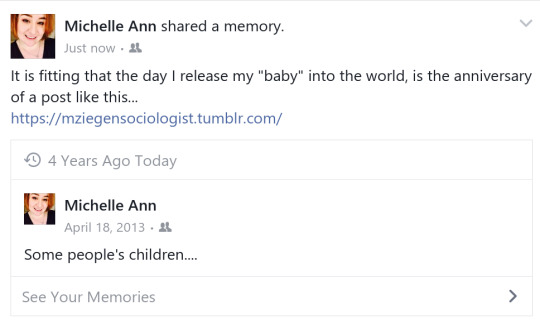
4 notes
·
View notes
Video
youtube
My Choice to Life Child-free
TEDxMileHighWomen
“In our society, we often assume that women will become mothers. But statistically, one in five American women will not have a biological child. In this powerful talk, Christen shares her decision not to have children, and argues that motherhood is an extension of womanhood, not the definition.”
2 notes
·
View notes
Text
Childfree By Choice: A Brief Study
My Personal Study on the Stigma of Being Childfree
For this project, I decided it would be interesting to create a survey and ask for participants who have chosen to live a childfree life to complete it.
Method:
A survey of questions regarding age; gender; background; sexuality; relationship preferences; attitudes towards children; and perceived pressures, biases, and stigma was given to each voluntary participant. Participants were assured that this survey was on a voluntary basis, their identities would be kept confidential, and that if they were uncomfortable answering any of the questions within the survey, they could skip those questions. The survey asked for their honest answers, as their answers would not be judged or graded in any way–their answers only to be used within the parameters of the study: to discern how people who live a voluntarily child-free lifestyle are treated and judged in society. The original survey can be found for free viewing within Google Documents at this link: https://docs.google.com/document/d/1v1ETJq9HNSiLlC31D-DB5XYtMRBgxW9dSM9poHt0SG0/edit?usp=sharing
Sample:
Six participants responded. Three female and three male. Two of the three men and one of three women at the time of the survey were in marital relationships, while one of three men and two of three women were single. One woman and one man who participated in the study were married to each other at the time of the survey. Age range for participants was 26 to 63. Ethnicity and background varied for participants: two participants listed Italian heritage, one listed Armenian heritage, one listed Russian and Hungarian heritage, and two listed Caucasian/White as their ethnicity. Religions included Christianity, Paganism, Agnosticism, and Judaism–one person not listing a religion.
One participant (married male) suffers from a major physical disability (blindness), and his significant other (also a survey participant) is his caretaker.
Findings:
Of those in the study, all of the participants were married or had hopes of one day being married. None of the participants preferred an alternate relationship form (or lack thereof). Reasons listed for wanting to be married included companionship, reciprocation of love, security, and fun. One participant stated it was “necessary to have a lifetime partner.”
Of those who were married, they stated that their partners held the same views on parenting as they do.
All participants showed a proclivity to enjoying pets as their “children” of choice.
Five of six participants stated that while they like children, they prefer not to have their own; while one participant stated he did not like children at all.
All single participants related difficulty in their search to find a potential mate due to their lifestyle choice.
“It makes it difficult to be honest with people, especially when you know you don’t want to have children of your own in the future if someone you love is determined to have a 2.5 kid family. In my experience, I’ve had to compromise and agree to having children if we continued the relationship, which is not something that I want and felt very pressured into. Now I make sure to make it known that at this time I do not want children, nor do I want to plan for children in the future.“ – M.K.
“That is one of the first things out of my mouth when I am engaging in a conversation with someone I am trying to get to know as a potential mate. If I see potential in someone, I tend to lay myself out like an open book so there are no secrets and no surprises. I have nothing to hide. That is a major topic that I need to discuss, because we need to be on the same page if we are going to be together.“ – J.C.
"Most of the females I have gone on dates with want children, so relationships have not progressed much further… I am upfront with my intentions of not having children so neither one of us invests time or feelings into something that will inevitably end over the subject of having children.” – K.L.
All participants had multiple reasons for not wanting to have children. Most participants decided early in their serious dating lives (in their twenties) that they were not going to have children. Though some participants note that their reasons have not changed, other reasons have been added since their initial decision.
“I enjoy the freedom of travel and lifestyle not having children permits. I enjoy spending my money on hobbies and the peace and quiet that is not interrupted by children in a household. I also saw how miserable my friends were when they had children, the stress it put on relationships, and the difficulties my male friends faced having to pay child support and try to make ends meet. Given the direction the world has headed in the past decade, I honestly wouldn’t want to bring a life into this world. There is so much hatred, intolerance, and idiocrasy that I feel I would be doing the child a disservice by bringing them into this environment. The other factors still remain true.“ – K.L.
"Childbirth scared me. It still scares me. I watched my sister have a c-section, and have watched friends deliver naturally, and it is terrifying. At the time, I was with someone who did not want any more children, and I decided I would give that up, as I was getting children (his children) without having to have my own, and I was okay with that. I’ve grown as an adult, a person, and as a woman. I have seen what pregnancy does to the body. It is not something that I want for myself. Also, my line of work does not exactly permit for a “mommy” lifestyle. One of the many challenges I face at work is taking on a call for a child. There is nothing on this planet that would devastate me more than losing my child, and that is a kind of pain I am not prepared for. It is not just losing my child either, it is the thought of someone hurting my child that would make me lash out in a rage that I know I would not be able to control. We get calls all the time that solidify, cement my stance on not wanting children. Maybe my most selfish reason I have for not wanting children is I cannot share them with my dad. They would never be able to know what it was like to grow up with him like I did. They wouldn’t hear his funny jokes and stories and share those memories like my nieces and nephews were able to. They would never be able to dance on his feet or have him chase them upstairs, and he will not be there when I am in the hospital in labor to hold my hand and tell me that I’d be a great mommy. And to me, that it is something that is very important that my children would not ever know how great their grandpa was.“ – J.C.
"Did not feel the need to pass on genes, or create a “legacy” - I’ve also seen the toll parenthood takes on a person, particularly my mother (read into this all you want, probably a good reason all around) - My brother and I made her absolutely miserable. While there might be some reward from it, the state that your life is forced into is inconvenient at best. I’m not as shallow or selfish as to say that I don’t want a child because that would mean my “lifestyle” would need to change, or it would be too difficult, or I’d have less free time or money - These aren’t reasons not to have a child IF I actually wanted one. I generally don’t feel the need or want to have a child. Additionally, my current lifestyle would not be able to support having a child (constant travel, long work hours) - Not to say that this lifestyle would not change had I the misfortune of gaining a child.” – A.Z.
“I didn’t have a partner, I didn’t want to have to give up my time and change my life—maybe a little selfishness. Watching my friend have nothing but issues with kids, it made me change my mind. I have the same reasons, but also now—the expense involved and the fact that you give up your life. It isn’t about you anymore, it is about them. And I experienced that, and had a taste of it—my oldest nephew was in jail, and his wife was arrested. There were two little kids. A boy that was about 8, and a girl around 3. And they were from a troubled family dynamic, and I was asked by my family to take them temporarily, which I did. And it was like I was an instant mom, in two days notice. And exactly what I felt was that I lost myself and my life. And everything is now about them. That really made my feelings come to light that it was not for me.” – S.F.
“I didn’t want the lifestyle. I wanted to do things or go out to eat or do things without having to worry about sitters. Some of it was monetary, but mostly it was that.” – E.F.
Two of three male participants have undergone vasectomies, and none of the men surveyed have any emotional issues with the possibility of being infertile. One female expressed an initial emotional issue with the possibility of being infertile, but stated that if she was, she would not have to worry about having an unwanted “parasite growing inside of [her] body.” – J.C.
Of the participants, the three single participants encounter higher amounts of pressure from family, potential mates, and others in society; and two of the three married participants noted some judgement of their lifestyle from others in society. However, all six of the people surveyed stated that they had not felt judged by any personal friends. Most participants stated that their friends were not only supportive, but also reinforced their choices by telling them they made a great decision. The two older participants (married to each other, and one suffering physical disability) stated their families were supportive of their choices.
“My mother has been trying to push me into having a relationship since I left my abusive ex-boyfriend (when I was 21), so that she can have more grandchildren. Some of my older sisters have had children, but one of my other sisters and I have not had children, and every boyfriend I start to date she immediately starts asking when we are going to have children. The only person she did not want me to have kids with was my abusive ex-boyfriend, because everybody hated him. When I first started talking to my current relationship prospect, he said “I feel like I am going to be a great dad someday,” and so it took me a few moments, but I told him I did not want children. His response was, “Why not? You would make such a great mom!” I told him that pregnancy isn’t something I would be excited about, it’s gross, ugly, and horrible. Pregnancy is hard on the body and I do not want my body to change in that way, and I like my sleep. I work long shifts. If that makes me selfish, then I don’t care. He understood, but he said that maybe I will change my mind “when I find the right man.”” – J.C.
“My family has placed pressure on me for the past 5-7 years to settle down, get married, and have children so they can have grandbabies and great grandbabies. This year they have started to accept that I do not want children and understand my reasoning. There is still an undertone of disappointment though… Family couldn’t understand how I wouldn’t want to have children and leave a legacy for a long time.” – K.L.
“[People in my family] are under the impression that one day I will change my mind and keep saying that I will rethink it in the future when I am ready.” – M.K.
“The only people who ask about children in my family are cousins who are constantly having children like it’s a hobby.” – A.Z.
Examples of targeting and attacking mentioned by participants included:
“Why wouldn’t you want to share the miracle of life?” “You’d be such a good mother.” “Why are you so selfish?” “I cannot believe you would deny me grandchildren.” “You’re self-centered.” “You’ll change your mind when you’re older.” “You’ll change your mind when you find the right man.” “You’ll get pregnant, and you’ll change your mind when you have your own.” “Why wouldn’t you want to leave a legacy?” “What if your significant other wants children? How could you deny them?” “You should be ready to have a family one day.”
“I had a patient, an 85-year-old woman, ask me how many kids I had. When I told her none, she asked why. Then she asked if I was married, and I answered that I was. And she asked why—and said the only reason to be married is to have children. I responded—first, you do not have to be married to have children… and I am married to be with my life partner, not for the purpose of having children (I am a RN in the home health field). Many of the home health field nurses and practitioners are Filipino and religious Catholics. And they assume you have had children and just ask you how many. When I say I have none, they are dumbfounded. “Why didn’t you have kids?”” – S.F.
“I do notice, and it is made clear, that people with children tend to hold themselves in higher regard just because they own a child.” – A.Z.
Single participants noted the difficulty of finding a partner, and the suffering of potential intimate relationships as a result of their choice.
Two participants of the study were either denied medical treatment or treated with hostility when asking for contraception or other treatment.
“My doctor told me that I was too young to make that decision, that I don’t mean it, that I will change my mind, that I need to go to church and find Jesus. She’s my general practitioner. My doctor refused to give me an IUD or implant, or any kind of permanent contraception, because she said I was too young and I would change my mind, even though that isn’t her decision to make.” – J.C.
“My doctor judged me for being a 32 year old single man that wants a vasectomy. Hesitated on giving me a referral to urologist and lectured on what if I change my mind or what if a future significant other wants children.” – K.L.
In closing, some participants added some insight into their lives and choices with closing responses:
“There are millions of children that have been brought into this world by unfit parents and I feel that society often passes judgment on those that make a responsible decision not to have children. This stigma needs to change and people should embrace each other’s decisions.” – K.L.
“Kids are a permanent decision. It is a permanent life-altering choice on both a woman and man’s part. And I do not really believe people really understand what it entails to be a parent. Nobody prepares themselves for parenting, nobody prepares for pregnancy and childbirth. Children are expensive. I am not even responsible enough for myself. Why would I bring a child into this world, knowing I cannot even do that for myself? How would I protect them all the time? I cannot keep them in a bubble. That’s frowned upon. I would only be able to teach them how to protect themselves. What if I do not do a good job and I am responsible for fucking up my own kid? I could never live with myself if I failed as a parent and created a monster, and they go out and make the world a more horrible place. I am too analytical and anxious to think that I am definitely going to be a good mother. Because what if I am not? What if my child would have been the next president or Neil Armstrong? But I do not want to take the chance to be responsible for a tiny human. We’ll start out with my cat, and see if I can keep him alive for years at a time. But I can’t even keep a houseplant alive. I could not imagine being the parent who lost their child to a car accident. Or have someone else responsible for the death of my child. I cannot even picture putting my elderly dog down. I would lose my mind, and I would be in a padded cell with a straightjacket. With a mouth guard like Hannibal Lecter.” – J.C.
“Most of the responses I get from people when they find out that my wife and I have not had kids is, “You were smart.” It isn’t a derogatory thing, it even came from parents. It’s just a lifestyle difference.” – E.F.
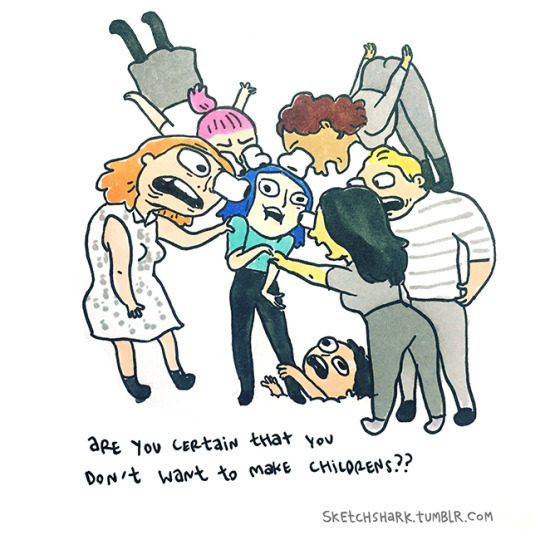
3 notes
·
View notes
Photo
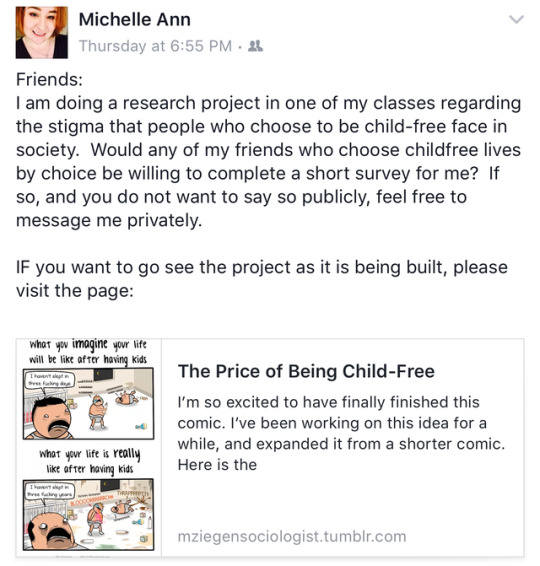

When posting on my personal Facebook page, asking for volunteers to participate in my study, a friend of my mother decided it was pertinent to show a perfect example of the judgement and stigma that those who choose a childfree lifestyle face on a daily basis.
It was no surprise that after she posted that comment, nobody else replied to my post -- as she made an otherwise safe, judgeless space a hostile one.
3 notes
·
View notes
Link
A Doctorate is Definitely More Difficult, Thanks
More of that wonderful judgmental nonsense from women who think they know better, because they’ve pushed out a child.
3 notes
·
View notes
Video
youtube
The Stream - Childfree by Choice
Al Jazeera English
“A growing number of people around the world are choosing to be childfree by choice.”
0 notes
Photo
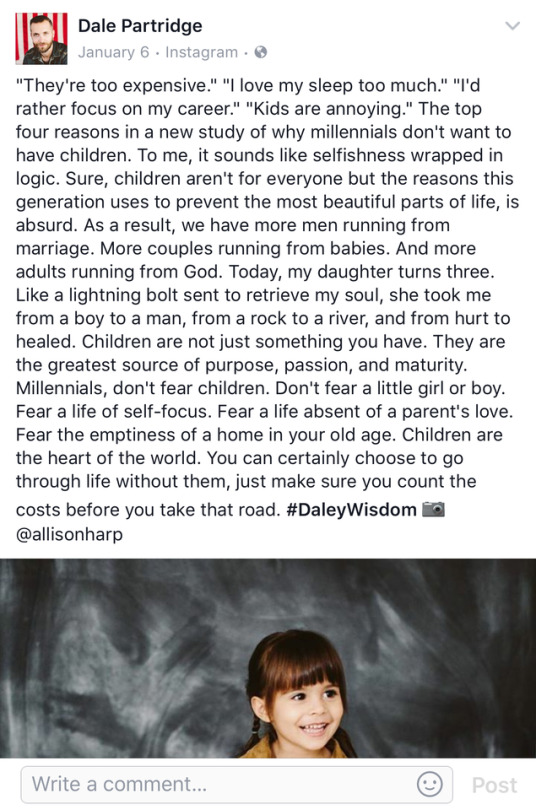
A self-proclaimed philosopher, professional blogger, entrepreneur, leader, and public figure (because he has a lot of followers on social media) explaining why choosing to be child-free is ‘selfish’ and ‘wrong’. How educated of him. Don’t forget the self-righteousness of his message, though, when he claims to know what the purpose and most fulfilling part of life is–for everybody. Not to mention his self-centered nature to hashtag “DaleyWisdom” as though he’s some prophet.
3 notes
·
View notes

